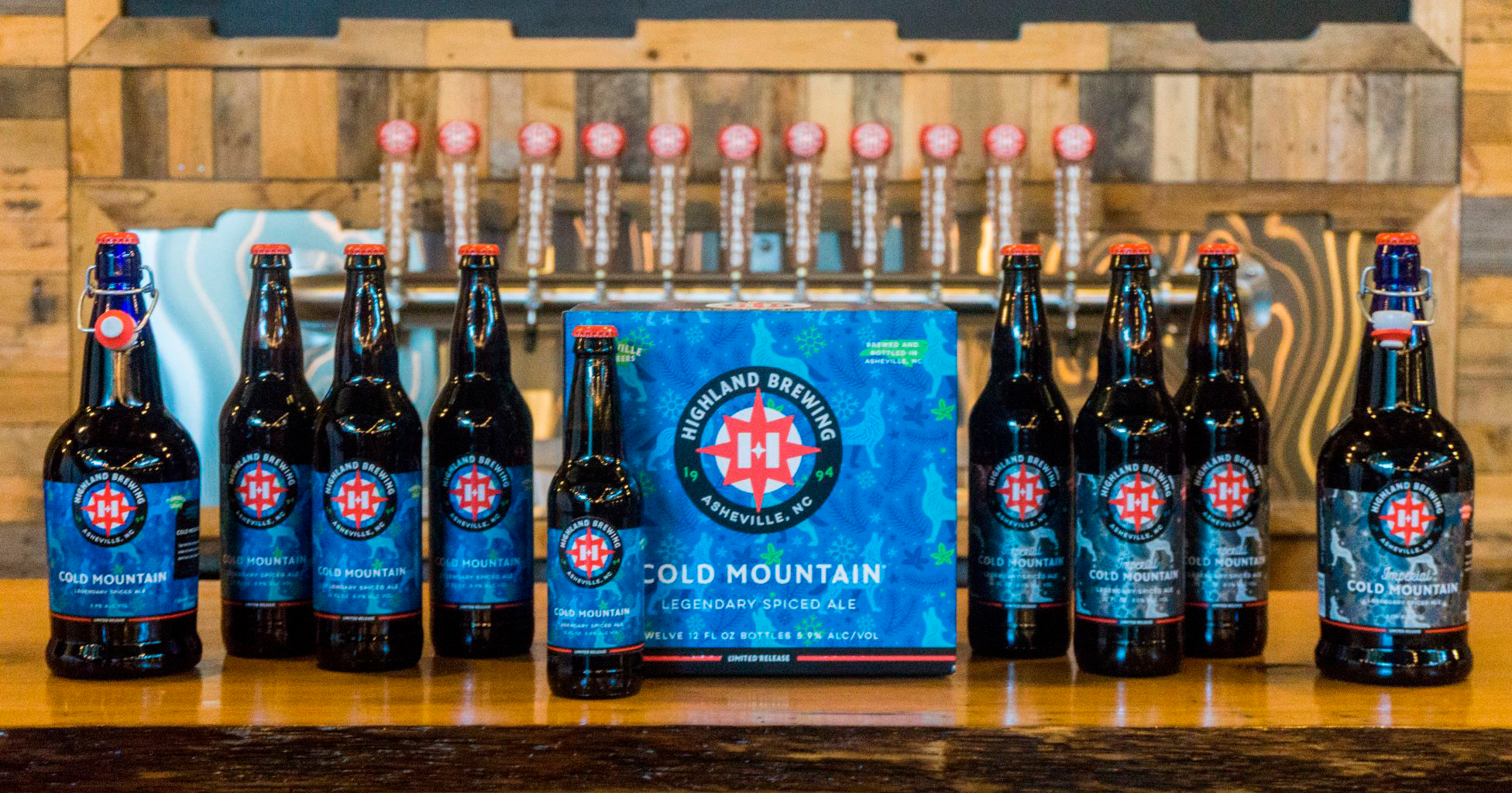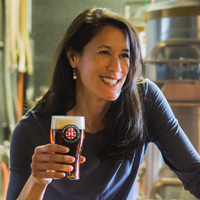 Two generations in, Highland Brewing is building a brand that others want to emulate
Two generations in, Highland Brewing is building a brand that others want to emulate
December 1994. That is when Oscar Wong rolled the first kegs from his Asheville, North Carolina basement to the alley. Built almost entirely from retrofitted dairy equipment, Oscar’s original brewery produced up to 6,500 barrels of beer per year in about 12,000 square feet of space.
Twenty five-plus years later, Oscar’s craft beer brand, the Highland Brewing Company, can brew more than 60,000 barrels annually—with room to grow. To solidify the growing prominence of the Highland Brewing brand, Oscar recently became the 34th recipient of the “Recognition Award,” which is given to individuals whose inspiration, enthusiasm and support have contributed to the craft brewing movement. Oscar, a Chinese-Jamaican immigrant, came to the US to study civil engineering. After a successful career in that field, he retired and founded Highland Brewing Company.
Today, the Highland Brewing team, led by his daughter, Leah Wong Ashburn, brews four times a day, five days per week on a 50-bbl brewhouse. The cellar has 27 fermenters, mostly 200bbls in size, as well as seven brite tanks, and can bottle up to 320 bottles per minute, averaging 800 cases per hour. Our bottling line is a state-of-the-art 2015 KHS 48-valve rotary machine.
In 2016, Highland Brewery cut the ribbon on a rooftop bar that accommodates 300 people—which it reserved for private events like weddings, rehearsals and corporate events. The indoor Event Center—complete with stage, mezzanine, two bars, catering kitchen and elevator—can fit (pre-pandemic) more than 700 people.
In addition, the first phase of Highland’s all-new hiking trails and volleyball courts on the brewery’s 40-acre campus opened to the public this spring. The trails offer a wooded retreat with sections along a creek and an old railroad just steps outside the brewery’s Taproom. While amenity use is limited during the pandemic, guests can enjoy a walk through the woods.
We sat down with Leah, President and CEO, and second-generation family owner, to get her thoughts on craft’s new landscape and how her brand is adapting to these unprecedented times.
What are some of the adjustments you made with/to your business model surrounding the recent state of events?
The events of this year proved just how resilient and creative our team can be when faced with new challenges. Like many breweries, we shifted our production to cans and bottles rather than kegs, and focused on off-premise and working with our wholesale partners. A Facebook Live video series kept us connected to our fans during the full shutdown. When we reopened onsite, freestanding sinks were available in every public area of the brewery along with quite a few other new health and safety measures.
What kind of conversations are you having with your customers?
I am having lots of conversations about gratitude—gratitude for our staff, for the customers who are supporting us through these hard times, and caring enough to share their feedback as we try to do so many new things and adapt to the times.
Use your platforms to make your audience feel like insiders. Share the stories that make your brand unique and authentic with your consumers. Ask them to participate and for goodness sake, respond.
What role should a brand play in being a leader in a distressed market?
Highland was built by our community, so community support has always been deeply embedded in our business model, no matter the state of the world around us. So the moment we learned that we would be able to keep brewing and keep our staff employed, we looked externally to see how we could help others. Highland was Asheville’s first craft brewery and we want to lead by example. Right now, we are supporting people, particularly the bar and restaurant workers, with our most comprehensive giving initiative to date.
“Give Back with Gaelic” is a program running through the end of the year in which we will donate a portion of the proceeds from sales of our flagship beer, Gaelic Ale, to 12 non-profits supporting hospitality workers across our whole Southeastern distribution footprint.
With our brand, we can set a tone in response to our shared experience of the pandemic.
What is the best piece of advice you can offer to other brands in how to deal with the unthinkable like this?
My father was born in Jamaica, but his family is Chinese. When I took over the leadership of the business from him, he gave me a scroll with two Chinese characters on it. Together, the symbols mean crisis. Apart, they mean risk and opportunity. He said, “When you are in crisis, you feel the risk. Look for opportunity.”
Give us a snapshot of today’s craft beer market from your perspective.
We have diversity in styles of beer, but we have work to do when it comes to creating a more diverse craft beer community. We are showing up to start that work, which is a practice and a long-term commitment to awareness. I am energized by the space that a more inclusive craft beer community could create.
What is likely to happen next?
I stopped trying to predict the future months ago. But in 2020, we flexed muscles we did not know we had. We are stronger now, so we are better prepared for whatever happens next.
What trends are defining the space?
As people spend more time at home, we are seeing traction with 12 packs, 15-packs and higher ABV beers. IPA is still king. Of course, in the larger view, seltzers are taking potential new beer drinkers and are likely to keep them away from beer.
Highland was built by our community, so community support has always been deeply embedded in our business model, no matter the state of the world around us.
What is your story from a brand perspective?
Immigrant-founded and now woman-led; Highland is the pioneer in Asheville craft beer and an iconic brewery. We are committed to being a good business in all senses of the phrase as we elevate and celebrate beer, business, people and place.
Walk us through your branding strategy.
Highland is a 26-year-old brand, so we balance our history of quality and consistency with the innovation that made us a trailblazer in the Southeast. We love where we live and share with pride the independent spirit and creative culture of our small city. We reach deeper into our story as a brewer, leader, community builder, versus reaching far out to less relatable brand expressions.
What is the biggest issue today related to the marketing/sales side of the craft beer business today?
Product differentiation is an issue for many breweries right now. When there are six hazy IPAs on the store shelf, how do you get your product to stand out? When my father founded Highland, he started from a place of quality and consistency in the product we put out in the market. That reputation has built over time and I think it has helped us stand out. People trust Highland to create a quality example of new trends.
We also face competition from big multi-national breweries buying up craft breweries. We can never compete with these conglomerates on price, so instead, we must tell a compelling brand story that is authentic and relevant to our consumer in a way that big beer cannot duplicate.
What is the secret to creating a branding story that consumers can buy into?
While I am not sure I know any secrets to create relevant brand stories, I can say that telling stories that are genuine to our people, relevant to the needs of our consumer, and consistent across all platforms from social media to the liquid in the glass. Decide who you are. Deliver on your brand promises.
What is the one thing that every craft beer brand should be doing in the way of marketing?
Use your platforms to make your audience feel like insiders. Share the stories that make your brand unique and authentic with your consumers. Ask them to participate and for goodness sake, respond.
What do you see as some of your biggest opportunities moving ahead?
We are excited to expand our offerings in 2021 to include an elevated tier of beers that are higher ABV, and have a different look and feel from our core lineup. And, in 2021, we have a second taproom opening in downtown Asheville in a historic building that will be a micro food hall.
What is the biggest item on your to-do list right now?
Cold Mountain is coming—our seasonal spiced brown ale is a cult favorite in Western North Carolina. I am so honored that this beer is the sign that the holiday season has arrived for so many fans. We are already getting calls from families who traditionally line up at 7 a.m. to be first to get their allocation. This year, in the midst of the pandemic, our celebration will spread out from three days to 10, to accommodate all our guests.
Story by Michael J. Pallerino, editor of Craft Brand & Marketing magazine. Over the past 30-plus years, he has won numerous awards, including the “Jesse H. Neal Editorial Achievement Award,” recognized as the Pulitzer Prize for business-to-business magazines. He can be reached at mikep@ccr-mag.com.
 Sitting down with…
Sitting down with…
Leah Wong Ashburn, President & CEO, Highland Brewing Company
What is the most rewarding part of your job?
Seeing the daily efforts of our team. What they put into their jobs lets me know Highland is more than a brewery.
What was the best advice you ever received?
Surround yourself with people who want you to succeed.
What is the best thing a customer ever said to you?
A local mom stopped me to say that Highland is part of their life. They come here every Friday to meet with friends and are so grateful for the place and space we share.
What is your favorite brand story?
In 2017, I told my father we would look at an evolutionary step in refreshing our brand. A John Deere or Starbucks approach—recognizable, but updated. Months later, I showed him a revolutionary new look. He asked if I liked it. I said yes, and gave him solid reasons why. He simply said, “Okay,” and we went full bore into a new era. I love that he trusted me.
